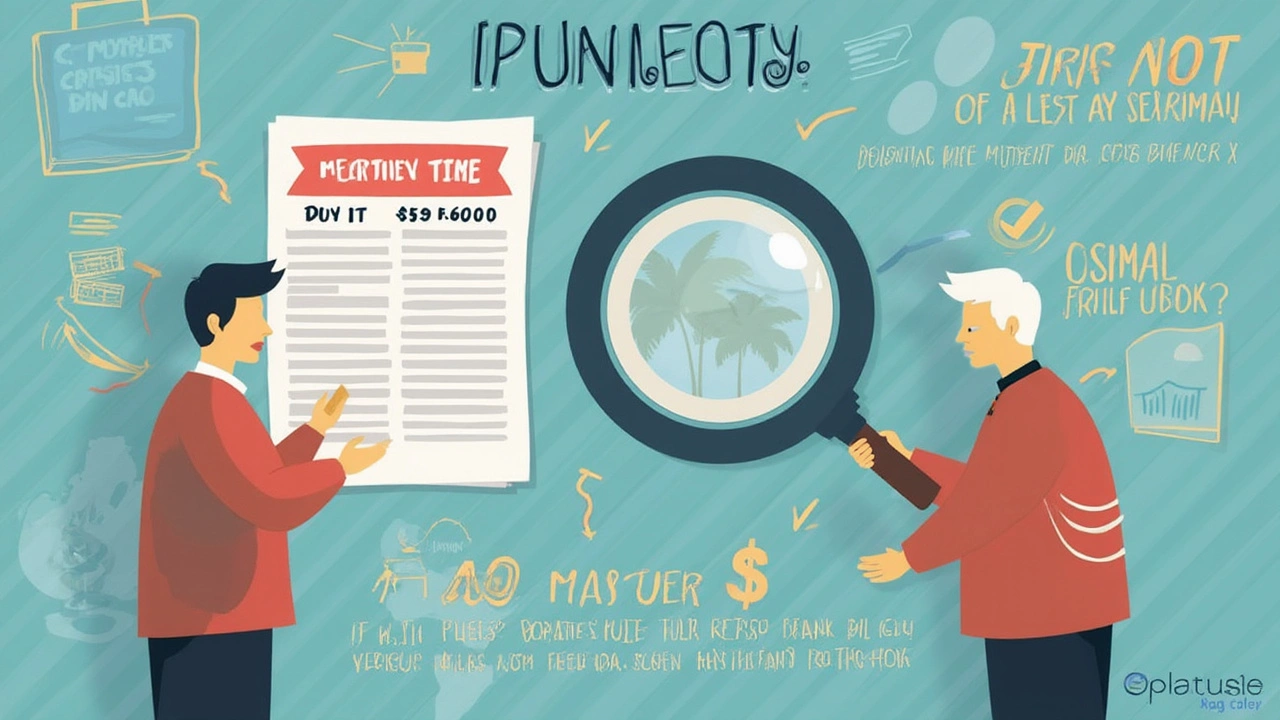Is It Worth Doing All Inclusive? Cheap Holidays Without Surprises
 Apr, 22 2025
Apr, 22 2025
All-inclusive holidays sound awesome, right? One price, everything covered, zero stress—at least that’s what the travel brochures promise. But hang on, does paying up front really mean you save money, or do you end up paying for stuff you don't even use?
I remember last summer, sitting with my friend Sofia on the balcony of a budget hotel in Spain. She'd just come from an all-inclusive place, and she swore she never once touched the gym, the nightly "entertainment," or even left her sun lounger by the pool. Which got us wondering if those extra perks are just smoke and mirrors.
If budget’s tight, you want to know exactly where your money goes. That’s why breaking down what an all-inclusive actually covers—and what it silently skips—makes a real difference. Don’t be fooled by the glossy photos; the fine print often decides whether you’re getting a steal or a splurge. Let's get into the nitty gritty of whether all-inclusive is worth it for cheap holidays or just looks that way from the outside.
- What Does ‘All Inclusive’ Actually Mean?
- When Does All Inclusive Make Sense?
- Hidden Costs: What’s Really Included?
- Tips for Snagging the Best Deals
- Mistakes to Avoid with All Inclusive
What Does ‘All Inclusive’ Actually Mean?
When you book an all inclusive holiday, you’re paying a set price up front that’s supposed to cover the essentials of your trip. Usually, this means your hotel room, meals, snacks, and most drinks (yes, even the cocktails by the pool). No digging for your wallet every five minutes; the main idea is to keep things simple and breezy, especially if you’re exploring cheap holidays options without wanting surprise bills.
But what’s behind that shiny promise? Not every resort includes exactly the same things, so here’s what you’ll typically find included:
- Meals: Breakfast, lunch, dinner, and in-between snacks. Buffets are standard. Sometimes à la carte meals are limited per stay.
- Drinks: Local spirits, wine, beer, and soft drinks. Premium brands often cost extra.
- Activities: Pool access, fitness centers, and non-motorized water sports (like kayaking or paddle boarding).
- Entertainment: Most resorts offer evening shows, live music, or even simple kids’ clubs.
- Room: Your accommodation, cleaned daily, with basics like air-con and, usually, free Wi-Fi.
What’s not always included? A lot, actually. Fancy dinners, certain water sports, airport shuttles, spa services, and off-resort excursions might not be part of the package—even some vacation costs like bottled water or in-room snacks can sneak up on you. That’s why it’s smart to scan the hotel’s list of inclusions before you book. Look for phrases like “select drinks,” “limited evening meals,” or “kids’ club available at extra charge.”
Here’s a quick cheat sheet on what’s typically included in a mid-range all-inclusive vs. what’s often left out:
| What’s Included | What’s Often Extra |
|---|---|
| Buffet meals, basic drinks, daily cleaning, pool, gym, evening shows | Premium drinks, à la carte dining, airport transfer, spa, excursions, kids’ clubs, motorized water sports |
If you want to avoid any nasty shocks, always ask for a breakdown of what's covered before you click that “Book now” button. The best all inclusive deals make it super clear what you can expect. That way, there are no money traps disguised as perks, and your cheap getaway really does stay cheap.
When Does All Inclusive Make Sense?
There are times when all inclusive deals are a total game-changer for cheap holidays—if you know what to look for. These packages shine most when you hate surprise expenses. Travelling with hungry teens or a friend who snacks non-stop? The buffet alone could justify the price. For families, unlimited drinks (soft drinks or coffee for the kids), snacks, and meals help dodge those sneaky food bills that pile up fast.
Got a destination where restaurants aren’t close by, or you’re staying at a remote resort? All-inclusive is your friend. It covers your meals and drinks, saving you both time and cab fares. Beach spots like the Dominican Republic or Turkey’s coastal areas are famous for their solid all-in deals—and for a reason: outside food is often overpriced or hard to find.
If you’re planning lots of poolside chilling and hardly stepping outside the hotel, you get your money’s worth. Some folks, like my cousin Max, travel just for the non-stop buffet and free-flowing drinks, never leaving the resort gates. For him, it’s perfect.
Group holidays with friends or a big family also make budgeting simple. You split the bill once, no bickering over who bought the last round of sodas or if Gina ordered another extra dessert. You know the cost from day one, so if you need to stick to a set budget, all inclusive can save you real headaches.
Check out some rough numbers from a survey of UK holidaymakers in 2024 who went with vs. without all inclusive packages:
| Holiday Type | Avg. Daily Spend (£) | Surprise Extra Costs? |
|---|---|---|
| All Inclusive | £42 (inc. food & drink) | Low |
| Self-Catering | £57 (food, drinks, & snacks) | High |
| Half Board | £51 | Medium |
So, if you want a set-it-and-forget-it price, tons of food, and don’t plan on exploring restaurants every day, all inclusive holidays can feel like a win. Just be honest about your travel style—are you really going to use what’s included, or would you rather mix it up outside the hotel?

Hidden Costs: What’s Really Included?
So you’ve spotted a juicy all inclusive deal and the price looks like a dream. But what actually comes with that price tag? Spoiler: not everything. The biggest trap with all inclusive cheap holidays is thinking everything’s covered when there are plenty of sneaky extras waiting to catch you out.
Most resorts include these basics in the package:
- Room (with basic amenities)
- Meals (buffet-style breakfasts, lunches, and dinners)
- Select snacks between meals
- Non-alcoholic and some local alcoholic drinks
- Pool and sunbed access
But here’s where they often draw the line:
- Premium drinks, cocktails, or imported alcohol
- A la carte restaurants (reservation fees or extra charges are common)
- WiFi outside lobby or room
- Room service (sometimes not included or comes with a delivery fee)
- Excursions, water sports, or activities run by outside providers
- Spa treatments and massages
- Childcare or kids’ club beyond specific hours
- Airport transfers
- Local tourist taxes
Here’s a quick look at what’s usually included versus what’s not at a typical budget all-inclusive:
| Included | Not Included |
|---|---|
| Buffet meals | Speciality dining/restaurants |
| Standard drinks (local) | Premium/imported alcohol |
| Pool/gym access | Spa, water sports, excursions |
| Basic snacks | Room service, minibar |
You’ll want to ask for a full list of what’s actually in your package before you book. Resorts use terms like “all included” or “ultra all inclusive,” but the difference usually comes down to what types of drinks and restaurants you can access without paying more.
Avoid the classic mistake: once you’ve paid for an all inclusive holiday, you don’t want to spend heaps extra on ‘extras’ that should have been included. For example, WiFi can cost up to €20 a week, and cocktails by the pool may not be part of the basic plan. Some places even charge for using a safe in your room. Not cool.
The bottom line: if you’re hoping to sip fancy drinks, try all the restaurants, and spoil yourself with spa days, double-check what’s covered. Otherwise, those extra charges can eat right through your cheap holidays budget.
Tips for Snagging the Best Deals
Let’s get straight to the point: not all all inclusive holidays are created equal. Prices swing wildly depending on where and when you book, what’s covered, and even how you search online. Knowing a few travel hacks can save you hundreds—even on already cheap holidays.
If you want the lowest prices, avoid peak school vacation times and public holidays like the plague. Most deals tank during the last two weeks of August, Christmas, and Easter. According to HolidayPirates, booking late (as in, just a few weeks before travel) gets you the steepest discounts because hotels panic about unsold rooms.
"Flexibility is key—if you can travel outside school breaks, you can often slash your costs in half," says Emma Coulthurst, travel expert for TravelSupermarket.
Also, check more than one website before you press “book.” Comparison sites like Trivago or Kayak help you scope out who’s got the best rate, but dig around the hotel’s own site too—sometimes they sneak in extra perks like a free room upgrade or spa credit if you book direct. It never hurts to email and ask!
- Sign up for price alerts on major holiday and hotel booking sites.
- Always clear your browser cookies or use incognito mode. Prices have been known to pop up when sites see you coming back for the same dates.
- Bundle your flights and hotel—sometimes you’ll unlock a discount the website won’t show separately.
- Read recent reviews. If people complain about hidden fees, like beach loungers or drinks, factor that into the real cost.
If you want a little data to back it up, here’s what site research showed about average savings on all inclusive bookings vs. self-catering:
| Type | Per Person/Week | Extra expenses |
|---|---|---|
| All Inclusive | £600 | £50 |
| Self-Catering | £350 | £200+ |
Sure, all inclusive costs more upfront, but you’re not sweating over lunch money or surprise drinks bills. Don’t forget to check for last-minute deals—if you’re not fussy about the destination, you can score some wild bargains as hotels rush to fill rooms.

Mistakes to Avoid with All Inclusive
Booking a all inclusive trip sounds like the easy option, but there’s a few traps that can turn your chill holiday into a bit of a mess. Here’s what real travelers wish they’d known before making the leap.
- Ignoring the Fine Print: Always check what’s actually included. Some places play games with the word ‘all’, so you might find yourself paying extra for basics like Wi-Fi, cocktails, or even certain buffet items. If you’re keen to stay on a cheap holidays budget, those sneaky extras add up fast.
- Poor Location Choices: All inclusives can sometimes be miles away from real towns or beaches, trapping you on the resort. If you want to explore or grab food outside, you might spend more on taxis than you saved by going all in.
- Skipping Reviews: Don’t just trust the hotel’s website or a few Instagram pics. Dive into reviews on trusted sites, especially for details about hidden fees or unadvertised rules. If tons of guests say the same negative thing, believe it.
- Not Checking Child or Activity Policies: Some great deals are for adults only or don’t include access to advertised features for kids. Others quietly charge extra for kids’ clubs or water sports. Make sure the so-called perks match your family or travel style.
- Missing the Boring But Important Stuff: Ever seen someone shocked by a daily resort fee, or local tax slapped on at checkout? It’s common. Ask for a full price breakdown before you book.
For a quick look at some extras you might miss, here’s a comparison table of common surprise charges at popular all inclusive resorts in 2024:
| Service | Included? | Potential Extra Cost (EUR per day) |
|---|---|---|
| Premium drinks | Often No | 10–25 |
| Airport transfers | Usually No | 15–30 |
| Room safe | Sometimes No | 2–5 |
| Specialty dining | Rarely | 20–50 |
| Wi-Fi | Mixed | Free–10 |
| Kids’ activities | Varies | 10–20 |
A simple rule: if you think something should be free at an all inclusive, ask before you arrive. Being a little nosy now will keep you from dumping cash on stuff you thought was already covered. That’s how you keep your budget in line and your vacation smooth.
